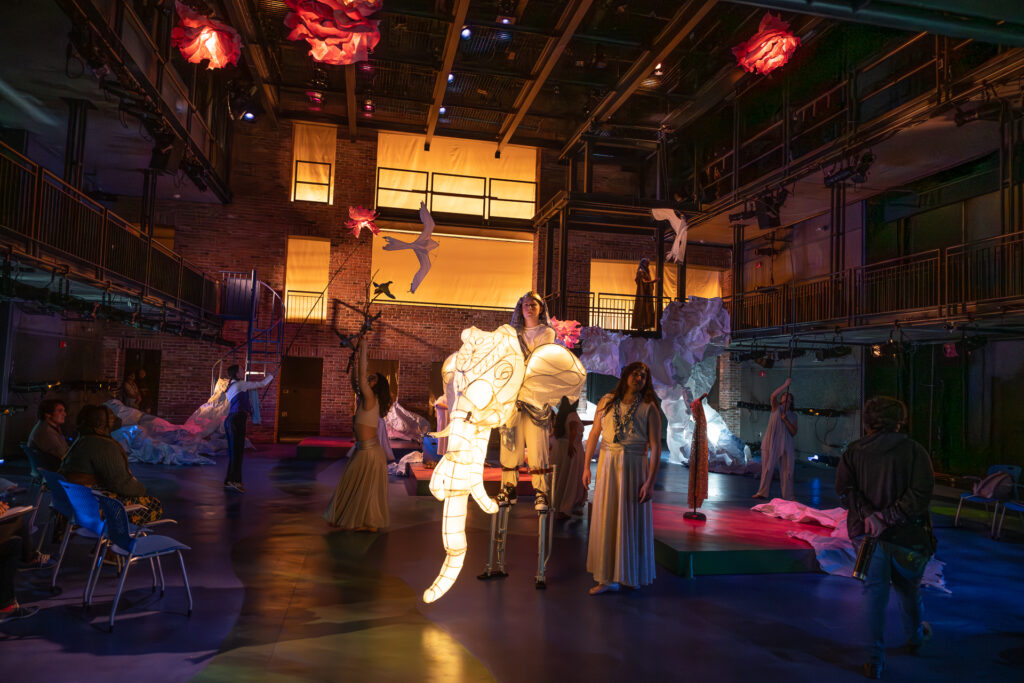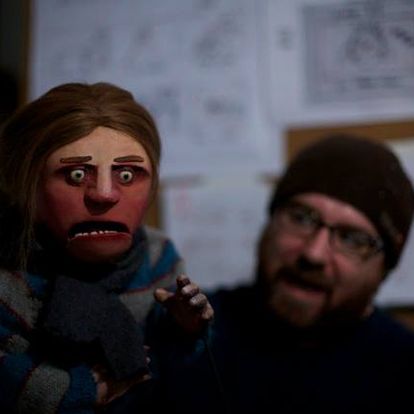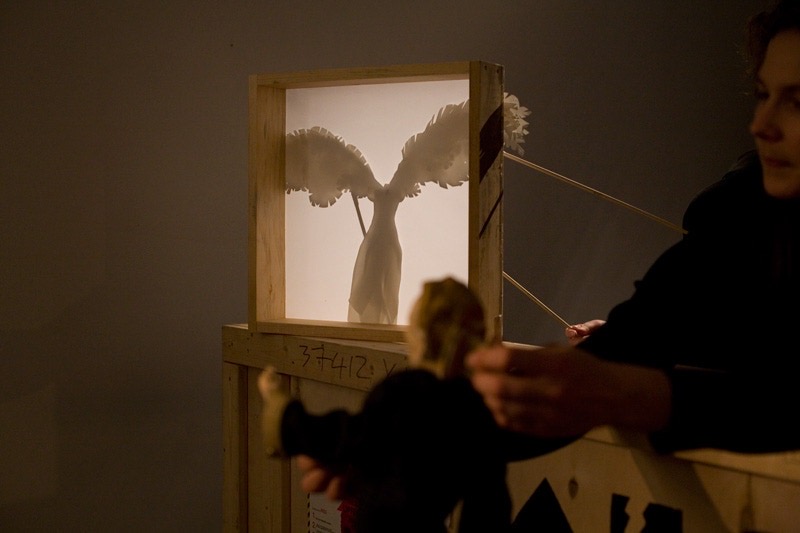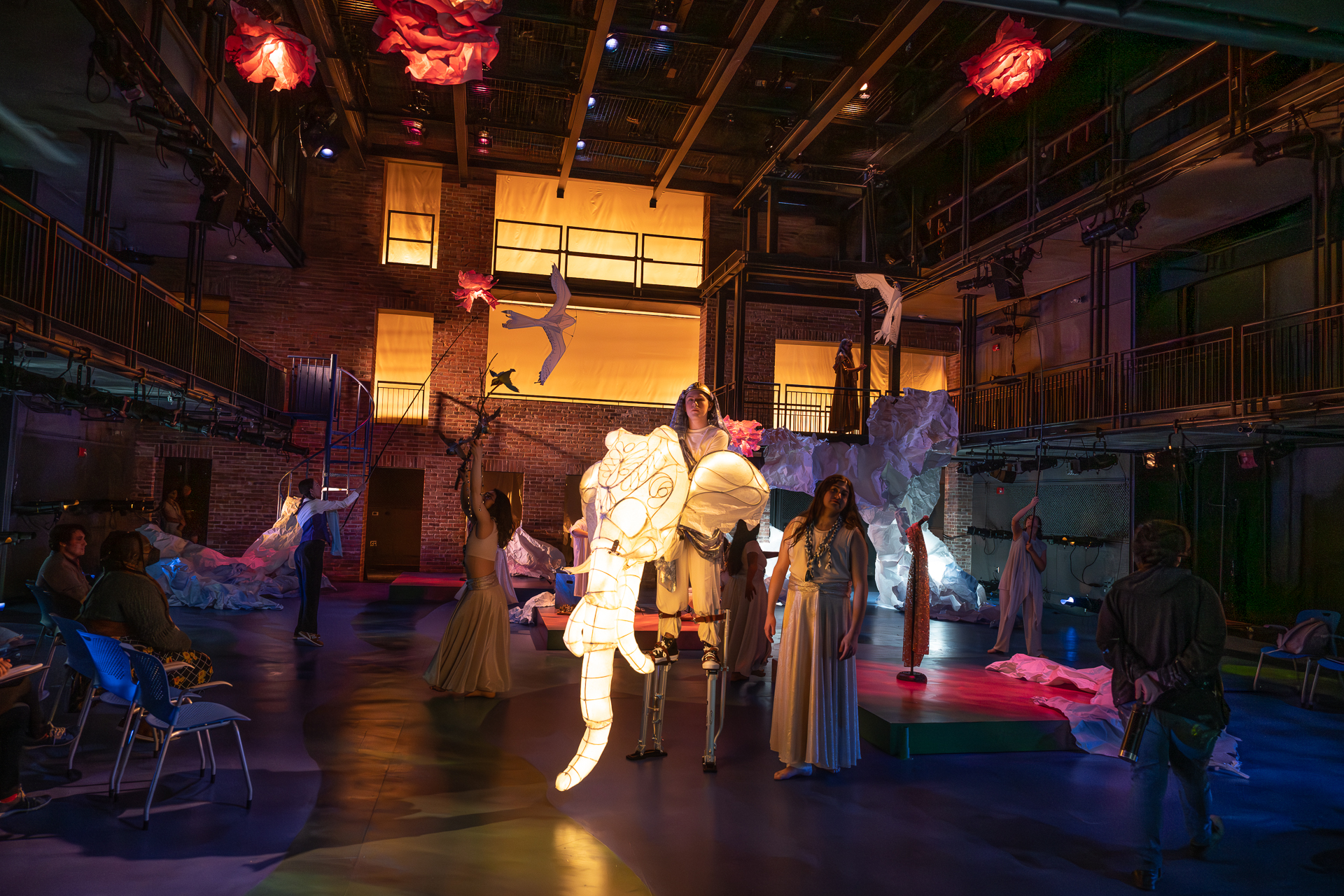
A look inside the world of Puppetry with David lane
“Can you tell me how to get ..How to get to Sesame Street” , the first time I heard those words sung , and saw that crazy green frog wave his hands above his head I was hooked , Sesame street was my introduction to the world of puppetry , it wasn’t just Muppets , I wanted to know more about Hand puppets, Marionettes , and life sized puppets operated by multiple puppeteers in all black , I even had an obsession with Bunraku a Japanese style of puppetry , I loved it all …. now cut to thirty or so years later I see an add for a Puppet Intensive workshop in Rowe ,Massachusetts , and I thought after all these years I’m going finally do something with my obsession, and thats where I met David Lane, he taught us movement , Improv, and how to make lifeless objects come alive.
David had made such an Impression on me that a few years later that I flew from Florida where I was living at the time to Newfoundland Canada to be part of a Illuminated puppet performance for the Lantern Festival , that they hold in St.John’s every year. Yes I dressed in black and operated a life size illuminated puppet along with other performers, now why would I travel all that way to perform for this amazing Director ? let me tell you a little about this amazing man and why I chose to interview him.
david studied drama at the University of Calgary then earned his MFA in Theatre from Sarah Lawrence College, He trained extensively with Calgary’s Green Fools Theatre Society before co-founding “The Old Trout Puppet Workshop, he’s been an Instructor at a number of colleges including SUNY Albany , Siena College and the Massachusetts College of Liberal arts.
and on top of all that David is a two-time Jim Henson Foundation grant recipient for his original play ” The Chronicles of Rose”. If ever I was going to choose someone to admire who works in the field of Puppetry its by far David Lane, I got the lucky pleasure to interview David and here’s how it went.
pictured is David with one of his puppets.

Me : David thanks so much for doing this and taking the time to answer my questions , first off What drew you to pursue a career in Puppetry and teaching the art of puppetry to Others?
David : Well, I don’t think I’m alone in saying that sometimes puppetry just finds you. And that was the case for me – I was working with a friend for a mask and stilt company in Calgary, Alberta and part of being part of that company was to create a show that tour music festivals and such .
So my buddy and I looked at each other one day and thought maybe this was our opportunity to create a Punch and Judy show. I’m not quite sure where this idea came from . We had been scouring PBS to see Julie- Taymore’s ” Fool’s Fire” , which was an incredible puppet show for film and when we finally watched it , something about it really stuck with us …It was this absurd style…grotesque characters, expressive and heightened emotion…something like Monty Python crosses with Excalibur crossed with the Muppet Show.
So we set to work under the guidance of Christine Cook one of the founders of the company and built a touring, seaside-style , glove puppet show.
In those days, you could go to the library and find all kinds of books on puppets and the history of Punch and Judy , and so we put to gather our own take – changing the characters to have a bit of a Canadian flair – replacing the english bobby with a Royal Canadian Mounted Police , that sort of thing.
And everything was sculpted out of clay , and then molded and cast. Christine helped us with costuming, and we built a striped tent that the whole thing would live in and then fold up into a suitcase. One of us would be in the tent to preform the show , the other one would be in a ridiculous dog suit costume providing a musical accompaniment in the form of a snare drum and various blocks of wood to augment the slapstick comedy that was happening on the play board.
I think teaching puppetry is kind of its own reward .Every time you get in a room with folks who are interested in the art form, it’s always amazing what direction it might go, Folks bring different perspectives , and even though as the facilitator of a workshop you might be setting the direction , its always amazing what people bring and add to the exercises that you never could’ve imagined on your own .

Me: Can you explain a little of the process or what steps you took from graduating from both the University of Calgary and also the Sarah Lawrence college to co-founding your own puppet workshop and co-directing shows with that workshop?
David: Well, I’m laughing a bit because this question is quite an enormous one ! I went to University of Calgary believing I would become a scholar of Russian literature . And I was pretty sure this was gonna happen too. I loved the plays of Anton Chekhov, and loved Fyodor Dostoyevski and Tolstoy , and I took a class in which we read all of Dostoyevski’s major works. But it was kind of lonely … sitting in my room, reading for a bunch of hours a day to get through some of these novels. Then I got Mononucleosis , and I was further isolated from my classmates for several weeks… bed ridden with a horrible fever, trying to get through Crime and Punishment… somewhere along the way I thought I needed more human contact.
So when I got back to school , I enrolled in a acting class with Keith Johnstone, who was kind of an improve theatre guru . And his class was so much fun and I was lucky enough to be invited up to his theatre , which he called the Loose Moose theatre, and take part in some special classes.
That really opened a door for me…I realized that when you study theatre ,that you are really studying human nature, psychology , are history , politics, philosophy- the whole schlimazel! it felt like a journey that would be endlessly fascinating.
After I got out of university I noodled around with some folks town, and we made a show that caught the attention of an experimental festival curator, and he told us to show up in a year with something new at his festival.
So we dove into making a grand new show…a puppet show with Muppet style grotesque latex-puppets, and delivered an entirely in an Italian gibberish about the life of Benvento Cellini, the famous I Italian braggart and goldsmith. the show was great fun … it was full of Puppet fencing and flying machines and absurd situations for our hero-we took it to Edmontonfringe festival and sold out overnight.
But for me, I kinda wanted to explore a more serious side of theatre – I still have the dead Russian authors on my mind and so I applied to various grad schools with the intention of trying to get in somewhere close to New York City, where I thought I should go study ” serious” Theatre, lol.
Sarah Lawerence just jumped out at me because they had a reputation for experimental theatre and when I visited the place, it was kind of incredible…University of Calgary was mostly built out in the 60’s and the buildings are that of brutalism aesthetic…super opressive utilitarian…I think it was Stalin’s favorite kind of architecture. Sarah Lawrence was the exact opposite …it had tutor style cottages , dotting the forest hills …I remember everyone was having lunch on the grass-and it had this relaxed kind of atmosphere about the whole place that seemed super productive to making art.
So that’s what I did for two years , during which time I saw theatre that kinda knocked my socks off – The Henson Festival was going on at that time…I met one of my mentors Dan Hurlin who spent the semester with us, plus I was fortune enough to get a project in my second year directing Anton Chekhov’s the seagull , so I could tick that off my list.

Me: When putting on a production or workshop what are some of the problems that you have to deal with?
David: Well, haha, every production is a little different . I’ve been involved in productions where actors have dropped out , where important props and puppets have broken right before the show .. shows where you get to your performance space and there’s water leaking from the ceiling or where you show up to tech and no-one else is there, But it’s all fine , stressful in the moment, but all fine, Because when you work in the theatre, you’re really working with people who are exploring the extremes of the human condition- you just hope that happens on stage more often than not!
Me: It can’t be easy putting on a production , there must be a ton of decisions that you have to make, have you ever had to make some difficult decisions or compromise any of your vision to get a production off the ground?
David: It’s true there is a lot that goes into directing a show or devising a show from ground up. I would say that in both those cases compromise is pessary at almost every turn. But it’s not compromise, you know, in a negative sense-really everything about theatre is collaborative , and that’s kind of a beautiful thing about it because you may feel like you’re saddled with directing a process, or facilitating a process-in which in the most successful sense, your goal is to create a space where people in the room can bring ideas to the flooring if enough of those ideas have legs, then you can synthesize it into an interesting piece of theatre.
Me: You’ve had the honor of being the recipient of not one but two Jim Henson Foundation grants to put on productions was that a difficult process and what exactly goes into applying for one of those grants?
David: Yeah, the Jim Henson Foundation is remarkable. They set aside funds to support new works of puppet theater every year and as you can imagine , it’s quite competitive . there is a process where you must submit a letter of intention March and then based on that letter, you receive an invitation to apply with the full application, or not receive an invitation, as the case may be. They’re looking for not just written narrative but also visual examples of what you intend to make. the full application must include a short video , so its quite a bit of work!

Me: I was lucky enough to be able to attend one of your workshops ( and hopefully attend another this summer) and to also work with you in Newfoundland to help them put on a production for the Lantern festival they do every year, what would you say are the skills or talents essential for someone looking to get into Puppetry?
David: Well, anyone can get into puppetry. And there are a few ways to go about that. you can approach it from a visual sensibility, or from preformance, or maybe you just have a story you need to tell and puppetry seems the way to do it, I don’t think you necessarily have to have skills initially . perhaps just a willing spirit and some perseverance.
Me: When most people think of puppetry they automatically think of the muppets, can you explain a little about the type of puppetry you do and what makes it different from what peoples perception of puppetry is?
David: Well, I’m a big fan of the Muppets for sure , and grew up with the Muppet Show as so many folks of my generation did. Jim Henson was a true innovator- working from his knowledge of European puppetry and adapting it for television, and figuring out how to make it work in concert with the medium of television as opposed to simply capturing the theatrical experience of puppetry on tv, which was the norm in the mid 50s and early 60s.
A lot of the puppetry I do is with puppets that are made from wood or other humble materials like wood and cloth. And I tend to favor working without dialogue ..where the actions of the puppets real the narrative , kind of like watching a silent movie.
Me: When you put on a workshop what are some of the skills or techniques you teach you’re students and do they vary depending on the type of production?
David: Well yes and no. Whatever kind of puppetry you’re doing there’s a baseline for understanding the performer’s relationship to the puppet and so a lot of the work starts with exercises that explore that relationship. We also ask ourselves questions about what the puppet is, and what the possibilities are for objects to become puppets, and the facilitate exercises to explore those questions.
interns of the construction workshops, yes, some are ultra focused on wood as a medium and others are more exploratory using found objects or unexpected natural materials, and then some of our workshops revolve around creating articulate, illuminated puppets, which can be performed at night or in a dark theatre space or a cave, that’s one thing I’m working on now…a puppet opera which will be premiered in a cave in Canmore , Aberta, Canada .
Me: How do you decide what kind of production you want to put on, and when doing tour own original productions what part do you find more difficult writing the story or building and designing the puppets?
David: Well I am in the process of doing this right now . you have to ask yourself what is potentially gonna keep your attention for the minimum of the next two years of your life, because that’s how long it usually takes to develop a new piece of puppet theatre. and for me, it’s really about the characters and if the characters are compelling, or the situations compelling, or there’s a question at the heart of the idea that’s compelling.
Me: If you could do it all over again based on what you’ve been through do you think you’d choose the same path for yourself? if so why? and what do you think you’d do differently?
David: This is an interesting question. Scotch anyone?!
I might like to have been an Abstract painter, I think. Maybe there’s still time..
Me: And finally what advice or a little bit of knowledge would you like to impart to those looking to pursue the same career path as you?
David: Well, I think I would strongly advise people to find collaborators … People they can trust and can work with, and compliment they’re own skill set . it’s tough to work on this stuff alone… it can be rewarding, but getting into a room with people.. then all kinds of unexpected things happen.
I would say find someone else’s work home you admire and see if you could talk to them or take a workshop with them or apprentice with them. And take workshops in general- you’ll be with like minded people and sometimes those can spark collaborations, and relationships, and conversations which will fuel all kinds of things .
Try to get out and see puppetry. Join a local puppetry guild and get involved with other folks who are sharing your interest. Have coffee with them or call them on the phone to solicit feedback on your ideas.

Make something every day. Even it’s just a small doodle or a watercolour or part of a carving. Developing a practice in puppetry is key- the more you can immerse yourself the better.. Writing, building, research…Even if not everything you do leads to a production, you’re gonna learn something about the art form, and about yourself and what is is that you like about it and hopefully that leads you to figure out what to do next.
